formerly eScholarship Editions


|
|
|
|
Your request for similar items found 20 book(s). | Modify Search | Displaying 1 - 20 of 20 book(s) | |
| 1. |  | Title: France and the cult of the Sacred Heart: an epic tale for modern times Author: Jonas, Raymond Anthony Published: University of California Press, 2000 Subjects: History | Religion | French Studies Publisher's Description: In a richly layered and beautifully illustrated narrative, Raymond Jonas tells the fascinating and surprisingly little-known story of the Sacré-Coeur, or Sacred Heart. The highest point in Paris and a celebrated tourist destination, the white-domed basilica of Sacré-Coeur on Montmartre is a key monument both to French Catholicism and to French national identity. Jonas masterfully reconstructs the history of the devotion responsible for the basilica, beginning with the apparition of the Sacred Heart to Marguerite Marie Alacoque in the seventeenth century, through the French Revolution and its aftermath, to the construction of the monumental church that has loomed over Paris since the end of the nineteenth century. Jonas focuses on key moments in the development of the cult: the founding apparition, its invocation during the plague of Marseilles, its adaptation as a royalist symbol during the French Revolution, and its elevation to a central position in Catholic devotional and political life in the crisis surrounding the Franco-Prussian War. He draws on a wealth of archival sources to produce a learned yet accessible narrative that encompasses a remarkable sweep of French politics, history, architecture, and art. [brief] Similar Items |
| 2. | 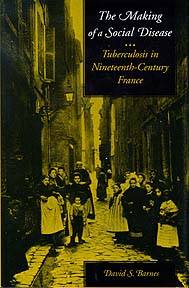 | Title: The making of a social disease;: tuberculosis in nineteenth-century France Author: Barnes, David S Published: University of California Press, 1995 Subjects: History | History and Philosophy of Science | Medicine | European History Publisher's Description: In this first English-language study of popular and scientific responses to tuberculosis in nineteenth-century France, David Barnes provides a much-needed historical perspective on a disease that is making an alarming comeback in the United States and Europe. Barnes argues that French perceptions of the disease - ranging from the early romantic image of a consumptive woman to the later view of a scourge spread by the poor - owed more to the power structures of nineteenth-century society than to medical science. By 1900, the war against tuberculosis had become a war against the dirty habits of the working class.Lucid and original, Barnes's study broadens our understanding of how and why societies assign moral meanings to deadly diseases. [brief] Similar Items |
| 3. | 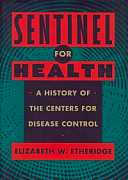 | Title: Sentinel for health: a history of the Centers for Disease Control Author: Etheridge, Elizabeth W Published: University of California Press, 1992 Subjects: History | Medicine Publisher's Description: In the only history of its kind, Etheridge traces the development of the Centers for Disease Control from its inception as a malaria control unit during World War II through the mid-1980s . The eradication of smallpox, the struggle to identify an effective polio vaccine, the unraveling of the secrets of Legionnaires' disease, and the shock over the identification of the HIV virus are all chronicled here. Drawing on hundreds of interviews and source documents, Etheridge vividly recreates the vital decision-making incidents that shaped both the growth of this institution as well as the state of public health in this country for the last five decades.We follow the development of the institution as it was transformed by the will and the imagination of remarkable individuals such as Dr. Joseph Mountin, one of the first heads of the CDC. Often characterized as abrasive and impatient, Mountin pushed the CDC to become a vital player in eradicating the threat of communicable disease in the United States. Others such as Dr. Andrew Langmuir brought the expertise necessary to establish epidemiology as one of the primary functions of the CDC.Created to serve the states and to answer any call for help whether routine or extraordinary, the CDC is now widely recognized as one of the world's premier public health institutions. [brief] Similar Items |
| 4. | 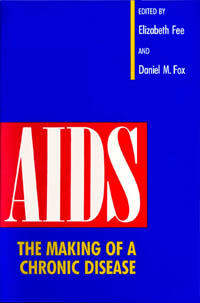 | Title: AIDS: the making of a chronic disease Author: Fee, Elizabeth Published: University of California Press, 1991 Subjects: History | Medicine | United States History | Sociology Publisher's Description: When AIDS was first recognized in 1981, most experts believed that it was a plague, a virulent unexpected disease. They thought AIDS, as a plague, would resemble the great epidemics of the past: it would be devastating but would soon subside, perhaps never to return. By the middle 1980s, however, it became increasingly clear that AIDS was a chronic infection, not a classic plague.In this follow-up to AIDS: The Burdens of History , editors Elizabeth Fee and Daniel M. Fox present essays that describe how AIDS has come to be regarded as a chronic disease. Representing diverse fields and professions, the twenty-three contributors to this work use historical methods to analyze politics and public policy, human rights issues, and the changing populations with HIV infection. They examine the federal government's testing of drugs for cancer and HIV, and show how the policy makers' choice of a specific historical model (chronic disease versus plague) affected their decisions. A powerful photo essay reveals the strengths of women from various backgrounds and lifestyles who are coping with HIV. A sensitive account of the complex relationships of the gay community to AIDS is included. Finally, several contributors provide a sampling of international perspectives on the impact of AIDS in other nations. [brief] Similar Items |
| 5. | 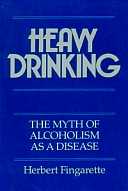 | Title: Heavy drinking: the myth of alcoholism as a disease Author: Fingarette, Herbert Published: University of California Press, 1988 Subjects: Science | Medicine Publisher's Description: Heavy Drinking informs the general public for the first time how recent research has discredited almost every widely held belief about alcoholism, including the very concept of alcoholism as a single disease with a unique cause. Herbert Fingarette presents constructive approaches to heavy drinking, . . . [more] Similar Items |
| 6. | 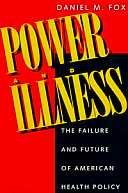 | Title: Power and illness: the failure and future of American health policy Author: Fox, Daniel M Published: University of California Press, 1993 Subjects: Sociology | Medicine | History | American Studies | United States History Publisher's Description: During most of this century, American health policy has emphasized caring for acute conditions rather than preventing and managing chronic illness - even though chronic illness has caused most sickness and death since the 1920s. In this provocative and wide-ranging book, Daniel Fox explains why this has been so and offers a forceful argument for fundamental change in national health care priorities.Fox discusses how ideas about illness and health care, as well as the power of special interest groups, have shaped the ways in which Americans have treated illness. Those who make health policy decisions have increased support for hospitals, physicians, and medical research, believing that people then would become healthier. This position, implemented at considerable cost, has not adequately taken into account the growing burden of chronic disabling illness. While decision makers may have defined chronic disease as a high priority in research, they have not given it such a priority in the financing of health services.The increasing burden of chronic illness is critical. Fox suggests ways to solve this problem without increasing the already high cost of health care - but he does not underestimate the difficulties in such a strategy. Advocating the redistribution of resources within hospital and medical services, he targets those that are redundant or marginally effective.There could be no more timely subject today than American health care. And Daniel Fox is uniquely able to address its problems. A historian of medicine, with knowledge of how hospitals and physicians behave and how health policy is made at government levels, he has extensively researched published and unpublished documents on health care. What he proposes could profoundly affect all Americans. [brief] Similar Items |
| 7. | 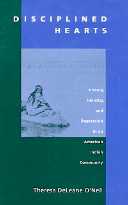 | Title: Disciplined hearts: history, identity, and depression in an American Indian community Author: O'Nell, Theresa DeLeane 1957- Published: University of California Press, 1996 Subjects: Anthropology | Folklore and Mythology | Native American Ethnicity | Native American Studies Publisher's Description: "This is a good place for your work. Depression is a big problem here. About 70-80% of our people are depressed." When she arrived at the Flathead Reservation in Montana to start an ethnographic study of depression, medical anthropologist Theresa DeLeane O'Nell repeatedly encountered such statements. This astonishingly widespread concern propelled the author into the complex lives of these modern American Indian people and into the historical roots of their contemporary situation.In Disciplined Hearts, O'Nell draws on recent anthropological theory to locate Flathead depression in the culturally organized experiences of an oppressed people. According to O'Nell, Flathead narratives of depression are tales in which narrators use their demoralization as a guide for modern Indian life. Underlying their tales, she says, is the dramatic assertion that depression is the natural condition of "real Indians" - those who have "disciplined" their hearts by recasting their personal sadness into compassion for others.This rich account of family and community life describes the moral imagination with which Flathead Indian people weave together historical and personal loss, American Indian identity, and social responsibility. Based on her ethnographic and clinical work, O'Nell pinpoints American Indian depression within a complex interplay of cultural ideas of the self and the Indian family, emotion and ethnic identity, and historical relations between Indians and whites. [brief] Similar Items |
| 8. | 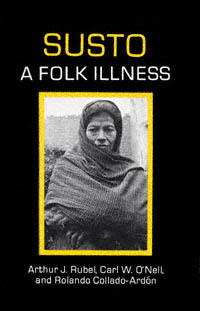 | Title: Susto, a folk illness Author: Rubel, Arthur J Published: University of California Press, 1984 Subjects: Anthropology | Medical Anthropology | Latin American Studies | Psychology Publisher's Description: Widespread throughout Latin America, susto is a folk illness associated with a broad array of symptoms. It is considered by susceptible populations to be a sickness caused by the separation of soul and body which is precipitated by a supernatural force. Most studies of culture-bound diseases have relied on descriptive approaches that focus on pathologies derived from medical textbooks. This study takes an interdisciplinary approach, looking for explanations of susto in the interaction of social, physiological, and psychological factors. [brief] Similar Items |
| 9. |  | Title: AIDS: the burdens of history Author: Fee, Elizabeth Published: University of California Press, 1988 Subjects: Medicine | Science Publisher's Description: The AIDS epidemic has posed more urgent historical questions than any other disease of modern times. How have societies responded to epidemics in the past? Why did the disease emerge when and where it did? How has it spread among members of particular groups? And how will the past affect the future - in particular, what does the history of medical science and public health tell us about our ability to control the epidemic and eventually to cure the disease?Historical methods of inquiry change, and people who use these methods often disagree on theory and practice. Indeed, the contributors to this volume hold a variety of opinions on controversial historiographic issues. But they share three important principles: cautious adherence to the "social constructionist" view of past and present; profound skepticism about historicism's idea of progress; and wariness about "presentism," the distortion of the past by seeing it only from the point of view of the present.Each of the twelve essays addresses an aspect of the burdens of history during the AIDS epidemic. By "burdens" is meant the inescapable significance of events in the past for the present. All of these events are related in some way to the current epidemic and can help clarify the complex social and cultural responses to the crisis of AIDS.This collection illuminates present concerns directly and forcefully without sacrificing attention to historical detail and to the differences between past and present situations. It reminds us that many of the issues now being debated - quarantine, exclusion, public needs and private rights - have their parallels in the past. This will be an important book for social historians and general readers as well as for historians of medicine. [brief] Similar Items |
| 10. |  | Title: The heart of the pearl shell: the mythological dimension of Foi sociality Author: Weiner, James F Published: University of California Press, 1988 Subjects: Anthropology Publisher's Description: For the Foi people who live on the edge of the central highlands of Papua New Guinea, the flow of pearl shells is the "heart" of their social life. The pearl shell is the exchange item that mediates the creation of their most important sexual and social roles. The Heart of the Pearl Shell analyzes a number of myths of the Foi people, elegantly bringing together significant ethnographic materials in a way that has important implications for the development of social theory in anthropology and in Melanesian studies. Scholars of semiotic-symbolic anthropology and of comparative religion will also share the author's interest in the meaning and role of mythology in Foi culture.Instead of relying on orthodox methods of Freudian or structuralist interpretation, James Weiner assumes there is a dialectical relationship between the images of Foi myth and the images of the Foi's social world. He demonstrates how each set of these images is dependent upon the other for its creation. This innovative study locates Foi social meaning in the re-creation and attempted solution of the moral dilemmas that are crystallized in mythology and other poetic usages. [brief] Similar Items |
| 11. | 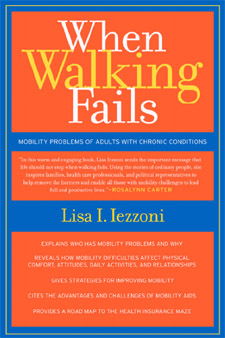 | Title: When walking fails: mobility problems of adults with chronic conditions Author: Iezzoni, Lisa I Published: University of California Press, 2003 Subjects: Medicine | Health Care | Sociology | Public Policy Publisher's Description: Roughly one in ten adult Americans find their walking slowed by progressive chronic conditions like arthritis, back problems, heart and lung diseases, and diabetes. In this passionate and deeply informed book, Lisa I. Iezzoni describes the personal experiences of and societal responses to adults whose mobility makes it difficult for them to live as they wish - partly because of physical and emotional conditions and partly because of persisting societal and environmental barriers. Basing her conclusions on personal experience, a wealth of survey data, and extensive interviews with dozens of people from a wide social spectrum, Iezzoni explains who has mobility problems and why; how mobility difficulties affect people's physical comfort, attitudes, daily activities, and relationships with family and friends throughout their communities; strategies for improving mobility; and how the health care system addresses mobility difficulties, providing and financing services and assistive technologies. Iezzoni claims that, although strategies exist to improve mobility, many people do not know where to turn for advice. She addresses the need to inform policymakers about areas where changes will better accommodate people with difficulty walking. This straightforward and engaging narrative clearly demonstrates that improving people's ability to move freely and independently will enhance overall health and quality of life, not only for these persons, but also for society as a whole. [brief] Similar Items |
| 12. |  | Title: Beriberi, white rice, and vitamin B: a disease, a cause, and a cure Author: Carpenter, Kenneth J. (Kenneth John) 1923- Published: University of California Press, 2000 Subjects: Science | Medicine Publisher's Description: In this comprehensive account of the history and treatment of beriberi, Kenneth Carpenter traces the decades of medical and chemical research that solved the puzzle posed by this mysterious disease. Caused by the lack of a minute quantity of the chemical thiamin, or vitamin B1 in the diet, beriberi is characterized by weakness and loss of feeling in the feet and legs, then swelling from fluid retention, and finally heart failure. Western doctors working in Asia after 1870 saw it as the major disease in native armed forces and prisons. It was at first attributed to miasms (poisonous vapors from damp soil) or to bacterial infections. In Java, chickens fed by chance on white rice lost the use of their legs. On brown rice, where the grain still contained its bran and germ, they remained healthy. Studies in Javanese prisons then showed beriberi also occurring where white (rather than brown) rice was the staple food. Birds were used to assay the potency of fractions extracted from rice bran and, after 20 years, highly active crystals were obtained. In another 10 years their structure was determined and "thiamin" was synthesized. Beriberi is a story of contested knowledge and erratic scientific pathways. It offers a fascinating chronicle of the development of scientific thought, a history that encompasses public health, science, diet, trade, expanding empires, war, and technology. [brief] Similar Items |
| 13. | 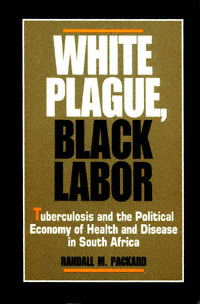 | Title: White plague, black labor: tuberculosis and the political economy of health and disease in South Africa Author: Packard, Randall M 1945- Published: University of California Press, 1989 Subjects: Anthropology | Medicine | Medical Anthropology | African Studies | Politics Publisher's Description: Why does tuberculosis, a disease which is both curable and preventable, continue to produce over 50,000 new cases a year in South Africa, primarily among blacks? In answering this question Randall Packard traces the history of one of the most devastating diseases in twentieth-century Africa, against the background of the changing political and economic forces that have shaped South African society from the end of the nineteenth century to the present. These forces have generated a growing backlog of disease among black workers and their families and at the same time have prevented the development of effective public health measures for controlling it. Packard's rich and nuanced analysis is a significant contribution to the growing body of literature on South Africa's social history as well as to the history of medicine and the political economy of health. [brief] Similar Items |
| 14. | 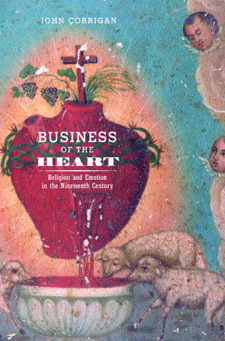 | Title: Business of the heart: religion and emotion in the nineteenth century Author: Corrigan, John 1952- Published: University of California Press, 2001 Subjects: Religion | American Studies | United States History | Christianity Publisher's Description: The "Businessmen's Revival" was a religious revival that unfolded in the wake of the 1857 market crash among white, middle-class Protestants. Delving into the religious history of Boston in the 1850s, John Corrigan gives an imaginative and wide-ranging interpretive study of the revival's significance. He uses it as a focal point for addressing a spectacular range of phenomena in American culture: the ecclesiastical and business history of Boston; gender roles and family life; the history of the theater and public spectacle; education; boyculture; and, especially, ideas about emotion during this period. This vividly written narrative recovers the emotional experiences of individuals from a wide array of little-used sources including diaries, correspondence, public records, and other materials. From these sources, Corrigan discovers that for these Protestants, the expression of emotion was a matter of transactions. They saw emotion as a commodity, and conceptualized relations between people, and between individuals and God, as transactions of emotion governed by contract. Religion became a business relation with God, with prayer as its legal tender. Entering this relationship, they were conducting the "business of the heart." This innovative study shows that the revival--with its commodification of emotional experience--became an occasion for white Protestants to underscore differences between themselves and others. The display of emotion was a primary indicator of membership in the Protestant majority, as much as language, skin color, or dress style. As Corrigan unravels the significance of these culturally constructed standards for emotional life, his book makes an important contribution to recent efforts to explore the links between religion and emotion, and is an important new chapter in the history of religion. [brief] Similar Items |
| 15. | 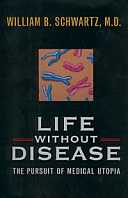 | Title: Life without disease: the pursuit of medical utopia Author: Schwartz, William B 1922- Published: University of California Press, 1998 Subjects: Science | Medicine | Economics and Business | History and Philosophy of Science | Public Policy Publisher's Description: The chaotic state of today's health care is the result of an explosion of effective medical technologies. Rising costs will continue to trouble U.S. health care in the coming decades, but new molecular strategies may eventually contain costs. As life expectancy is dramatically extended by molecular medicine, a growing population of the aged will bring new problems. In the next fifty years genetic intervention will shift the focus of medicine in the United States from repairing the ravages of disease to preventing the onset of disease. Understanding the role of genes in human health, says Dr. William B. Schwartz, is the driving force that will change the direction of medical care, and the age-old dream of life without disease may come close to realization by the middle of the next century. Medical care in 2050 will be vastly more effective, Schwartz maintains, and it may also be less expensive than the resource-intensive procedures such as coronary bypass surgery that medicine relies on today.Schwartz's alluring prospect of a medical utopia raises urgent questions, however. What are the scientific and public policy obstacles that must be overcome if such a goal is to become a reality? Restrictions on access imposed by managed care plans, the corporatization of charitable health care institutions, the increasing numbers of citizens without health insurance, the problems with malpractice insurance, and the threatened Medicare bankruptcy - all are the legacy of medicine's great progress in mastering the human body and society's inability to assimilate that mastery into existing economic, ethical, and legal structures. And if the average American life span is 130 years, a genuine possibility by 2050, what social and economic problems will result?Schwartz examines the forces that have brought us to the current health care state and shows how those same forces will exert themselves in the decades ahead. Focusing on the inextricable link between scientific progress and health policy, he encourages a careful examination of these two forces in order to determine the kind of medical utopia that awaits us. The decisions we make will affect not only our own care, but also the system of care we bequeath to our children. [brief] Similar Items |
| 16. | 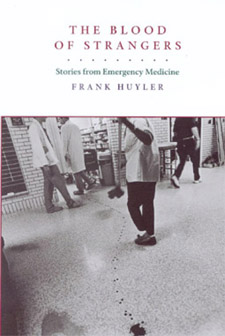 | Title: The blood of strangers: stories from emergency medicine Author: Huyler, Frank 1964- Published: University of California Press, 1999 Subjects: Medicine | American Literature | Autobiography Publisher's Description: Reminiscent of Chekhov's stories, The Blood of Strangers is a visceral portrayal of a physician's encounters with the highly charged world of an emergency room. In this collection of spare and elegant stories, Dr. Frank Huyler reveals a side of medicine where small moments - the intricacy of suturing a facial wound, the bath a patient receives from her husband and daughter - interweave with the lives and deaths of the desperately sick and injured. The author presents an array of fascinating characters, both patients and doctors - a neurosurgeon who practices witchcraft, a trauma surgeon who unexpectedly commits suicide, a wounded murderer, a man chased across the New Mexico desert by a heat-seeking missile. At times surreal, at times lyrical, at times brutal and terrifying, The Blood of Strangers is a literary work that emerges from one of the most dramatic specialties of modern medicine. This deeply affecting first book has been described by one early reader as "the best doctor collection I have seen since William Carlos Williams's The Doctor Stories ." [brief] Similar Items |
| 17. | 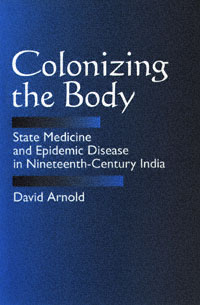 | Title: Colonizing the body: state medicine and epidemic disease in nineteenth-century India Author: Arnold, David 1946- Published: University of California Press, 1993 Subjects: Asian Studies | South Asia | Asian History | Medicine | History Publisher's Description: In this innovative analysis of medicine and disease in colonial India, David Arnold explores the vital role of the state in medical and public health activities, arguing that Western medicine became a critical battleground between the colonized and the colonizers.Focusing on three major epidemic diseases - smallpox, cholera, and plague - Arnold analyzes the impact of medical interventionism. He demonstrates that Western medicine as practiced in India was not simply transferred from West to East, but was also fashioned in response to local needs and Indian conditions.By emphasizing this colonial dimension of medicine, Arnold highlights the centrality of the body to political authority in British India and shows how medicine both influenced and articulated the intrinsic contradictions of colonial rule. [brief] Similar Items |
| 18. | 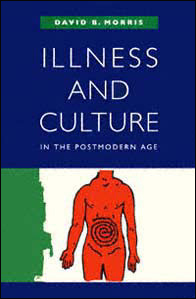 | Title: Illness and culture in the postmodern age Author: Morris, David B Published: University of California Press, 1998 Subjects: Sociology | Philosophy | Medicine | Technology and Society | Anthropology | American Studies Publisher's Description: We become ill in ways our parents and grandparents did not, with diseases unheard of and treatments undreamed of by them. Illness has changed in the postmodern era - roughly the period since World War II - as dramatically as technology, transportation, and the texture of everyday life. Exploring these changes, David B. Morris tells the fascinating story, or stories, of what goes into making the postmodern experience of illness different, perhaps unique. Even as he decries the overuse and misuse of the term "postmodern," Morris shows how brightly ideas of illness, health, and postmodernism illuminate one another in late-twentieth-century culture.Modern medicine traditionally separates disease - an objectively verified disorder - from illness - a patient's subjective experience. Postmodern medicine, Morris says, can make no such clean distinction; instead, it demands a biocultural model, situating illness at the crossroads of biology and culture. Maladies such as chronic fatigue syndrome and post-traumatic stress disorder signal our awareness that there are biocultural ways of being sick.The biocultural vision of illness not only blurs old boundaries but also offers a new and infinitely promising arena for investigating both biology and culture. In many ways Illness and Culture in the Postmodern Age leads us to understand our experience of the world differently. [brief] Similar Items |
| 19. |  | Title: Emptying beds: the work of an emergency psychiatric unit Author: Rhodes, Lorna A. (Lorna Amarasingham) Published: University of California Press, 1991 Subjects: Anthropology | Medical Anthropology | Psychiatry | Social Problems | Medicine Publisher's Description: The work of inner-city emergency psychiatric units might best be described as "medicine under siege." Emptying Beds is the result of the author's two-year immersion in one such unit and its work. It is an account of the strategies developed by a staff of psychiatrists, social workers, nurses, and ot . . . [more] Similar Items |
| 20. | 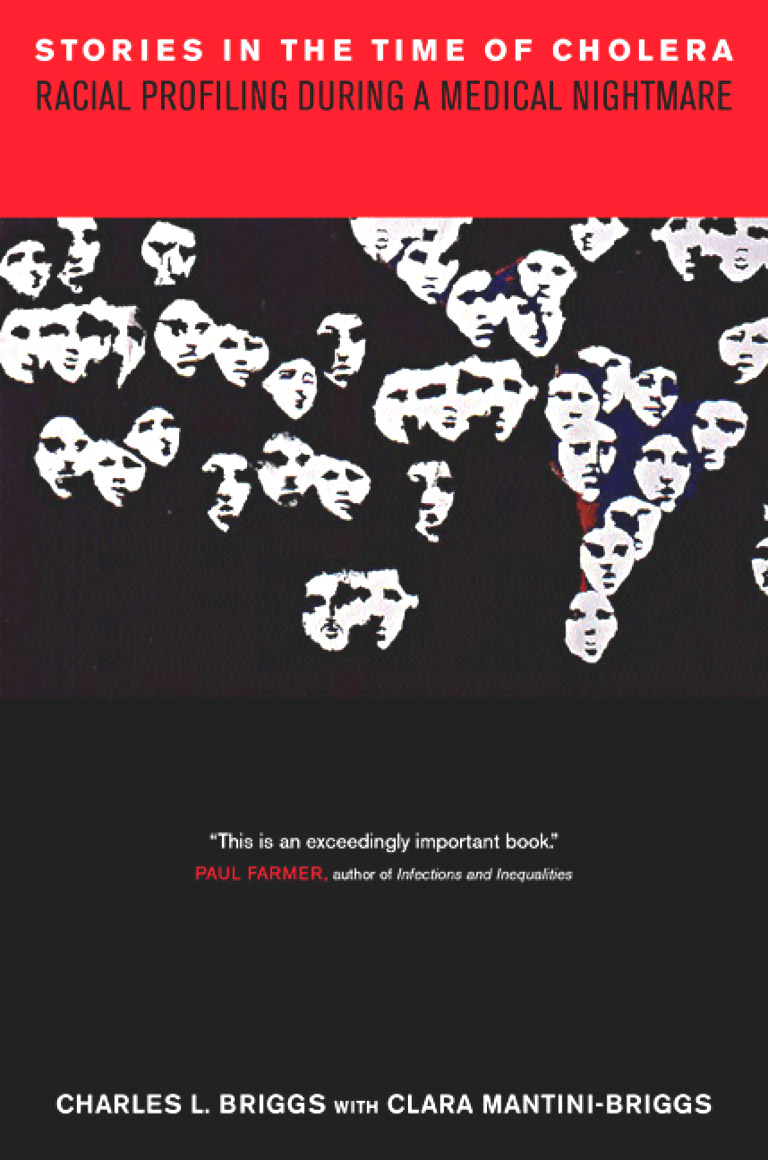 | Title: Stories in the time of cholera: racial profiling during a medical nightmare Author: Briggs, Charles L 1953- Published: University of California Press, 2003 Subjects: Anthropology | Latin American Studies | Ethnic Studies | Disease | Medical Anthropology Publisher's Description: Cholera, although it can kill an adult through dehydration in half a day, is easily treated. Yet in 1992-93, some five hundred people died from cholera in the Orinoco Delta of eastern Venezuela. In some communities, a third of the adults died in a single night, as anthropologist Charles Briggs and Clara Mantini-Briggs, a Venezuelan public health physician, reveal in their frontline report. Why, they ask in this moving and thought-provoking account, did so many die near the end of the twentieth century from a bacterial infection associated with the premodern past? It was evident that the number of deaths resulted not only from inadequacies in medical services but also from the failure of public health officials to inform residents that cholera was likely to arrive. Less evident were the ways that scientists, officials, and politicians connected representations of infectious diseases with images of social inequality. In Venezuela, cholera was racialized as officials used anthropological notions of "culture" in deflecting blame away from their institutions and onto the victims themselves. The disease, the space of the Orinoco Delta, and the "indigenous ethnic group" who suffered cholera all came to seem somehow synonymous. One of the major threats to people's health worldwide is this deadly cycle of passing the blame. Carefully documenting how stigma, stories, and statistics circulate across borders, this first-rate ethnography demonstrates that the process undermines all the efforts of physicians and public health officials and at the same time contributes catastrophically to epidemics not only of cholera but also of tuberculosis, malaria, AIDS, and other killers. The authors have harnessed their own outrage over what took place during the epidemic and its aftermath in order to make clear the political and human stakes involved in the circulation of narratives, resources, and germs. [brief] Similar Items |